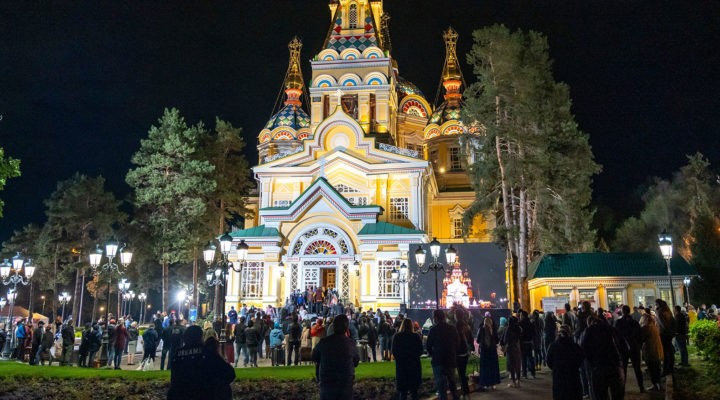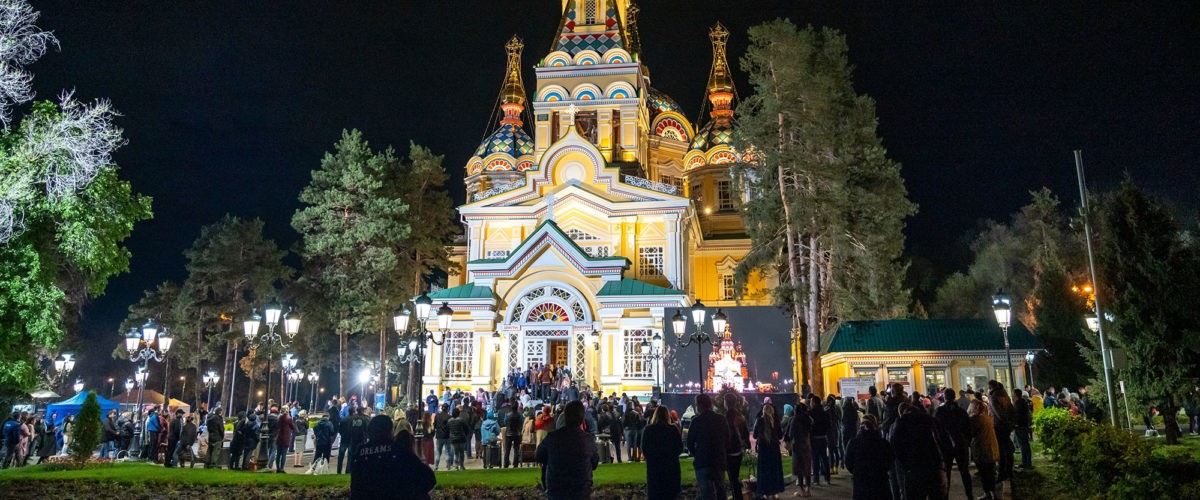American officials are praising the Republic of Kazakhstan for considering religious freedom reforms that would help prevent the spread of extremism in Central Asia, hold off the political influence of neighboring China and enable minority faith groups, including Baptists, to assemble without official and grassroots persecution.
But the former Soviet republic, which is eager to change its international image, will remain on the U.S. Commission on International Religious Freedom’s watch list for maintaining laws that foster extreme violations of religious freedom, USCIRF Chair Nadine Maenza said.

Nadine Maenza
“In Kazakhstan we have seen, overall, an improvement and we’ve seen a willingness to engage at a level that isn’t typical,” she said. “But while they are moving toward greater religious freedom, the key is changing their restrictive laws. We have seen some inertia there.”
The resistance comes from numerous quarters, USCIRF policy analyst Jason Morton said in an Aug. 6 podcast about Kazakhstan’s current religious landscape. Elements within the national government, as well as many local and regional authorities, fear that permitting freedoms for outsider religious groups could attract fundamentalist groups including jihadists from neighboring Afghanistan.
Opponents want to maintain the integrity of Kazakhstan’s highly restrictive 2011 religion law that imposed harsh limits on the existence and movements of Jehovah’s Witnesses, Pentecostals, Baptists, some Muslim sects, and other minority faith groups.
There also is strong grassroots and law enforcement suspicion of these smaller, nontraditional religions in part tied to a desire to maintain ethnic and cultural identity, Morton said.
Today, about 70% of the nation’s 19 million citizens are Sunni Muslims and 26% are Christian with smaller populations of Jews, Buddhists, Baha’i and Hare Krishnas, according to a USCIRF report. About 60% of the population are ethnic Kazakhs, Morton said.
The Catholic and Eastern Orthodox churches are among the largest Christian organizations and as a result are among those who enjoy greater freedoms, while the activities of smaller faith groups are severely limited, including having to register to lawfully meet and to submit all religious documents for approval. “Proselytizing and the distribution of religious literature are heavily controlled,” Morton said.
In some cases, religious groups have bucked those rules, Maenza said. “Some Baptists have registered, but some have refused because the process goes against their beliefs. So, they are subject to a tougher treatment when they are not following the regulations.”

Jason Morton
But the harsh treatment of religious minorities is not in keeping with Kazakhstan’s history of religious diversity, Morton said.
Soviet dictator Joseph Stalin deported religious minorities to the area from across the USSR during his reign, and a mass migration from western Russia occurred after World War II. Western influence — and with it Western religion — surged in Kazakhstan in the late- and post-Soviet eras, he said.
In 2003, the nation launched the Congress of Leaders of World and Traditional Religions. Held every three years, the international interfaith gathering gathers leaders from established traditions for talks on issues such as religious extremism and terrorism.
While the U.S. government considers the congress a positive sign of Kazakhstan’s commitment to interfaith dialogue, it is also pressuring the government to start inviting religions it has yet to officially recognize or welcome domestically, Morton said.
Despite the negatives that keep Kazakhstan on the watch list, Maenza said, there are undeniably promising signs the nation is moving to positively change the way it treats minority faith groups.
Chief among them is the nation’s engagement with U.S. State Department and USCIRF officials through the U.S.-Kazakhstan Working Group on Religious Freedom, which has met multiple times since 2018, Maenza said.
“These are hours-long sessions where we go through their laws. It’s really vulnerable for a country like this to open their books, look at what is wrong and discuss what they should change,” she explained. “The fact that they have taken that information back and internalized it to see how they can make it work in their context is to be commended. We don’t see that very often.”
A key U.S. argument is that increasing religious freedom will make Kazakhstan safer because extremism struggles in pluralistic societies.
A key U.S. argument is that increasing religious freedom will make Kazakhstan safer because extremism struggles in pluralistic societies, she said. “Religious freedom and national security can go hand-in-hand when done wisely.”
But it will take time for religious freedom supporters in Kazakhstan to work through domestic cultural and political concerns, Maenza said.
“We are making the case that religious freedom will make their society stronger. Their security officials need to be trained to see how these Baptists and Ahmadiyya Muslims and other minorities are not dangerous to their security but can make their society stronger.”
The U.S. is pulling for other nations to take a que from Kazakhstan’s progress, she said. “When governments foster religious freedom conditions, it actually prevents violent extremism and increases economic activities. Once they see that happening in other countries, the hope is they will follow suit.”
Americans should care about religious freedom in Kazakhstan because it can foster much-needed stability in a region sandwiched between war-torn Afghanistan and China — and reduce the need for future U.S. intervention, Maenza said.
“They are sitting in a tough neighborhood, which is why they need to be commended for doing what they are doing.”
Related articles:
U.S. religious freedom monitoring agency raises concern again about abuses in Algeria
21Wilberforce ranks members of 116th Congress on support for international religious freedom


